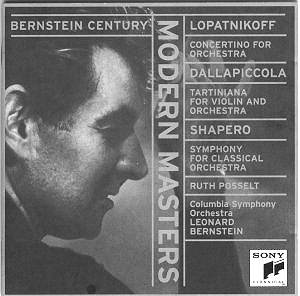For two days in 1953 Bernstein and the Columbia SO
toiled away to make these recordings. The resulting LPs are very rarely
encountered now. I wonder how many were pressed? They would now be almost
half a century old so the chances of their surviving in mint condition
are slender. Those LPs emerged in 1954 and 1955 and also included the
Hill Prelude (reissued on SMK 61849).
Who now remembers Nikolai Lopatnikoff? Yet during
the 1950s this Estonian-born composer was feted by Koussevitsky among
others. In 1944 fleeing the all too deadly fate of the wartime Baltic
states he became a US citizen and the Concertino is from
that same year. No composer springs forward uninfluenced and in Lopatnikoff's
case his self-declared forebears were Borodin, Mussorgsky, Hindemith
and Stravinsky. In the Concertino the cool, lyrical and abrasively
athletic Stravinsky of Pulcinella is in the driving seat. Bernstein
lacks nothing in jabbing skittishness and busy vitality. The finale,
with its piano interjections, recalled the Shostakovich First Piano
Concerto.
Dallapiccola is quite another kettle of fish.
Tim Page's notes claim for him a profound lyrical gift alongside a clear-headed
and total dedication to dodecaphonic music. He is not alone in this
as we can hear from the still far too little known music of Benjamin
Frankel. Tartiniana is based on four violin sonatas by the 18th
century Italian, Giuseppe Tartini. The four movements feature violinist
Ruth Posselt in music that has some quite conservative dissonance but
otherwise might be an updated Four Seasons - grave, flighty and groaningly
determined as in the finale. Schnittke in his early works favoured this
same acrid neo-classical approach. There is also a Tartiniana Seconda
- but not recorded here!
Harold Shapero's Symphony for Classical Orchestra
is a precursor to the classical, almost look-alike, efforts of George
Rochberg both in his violin concerto and mid-period string quartets.
Speaking of quartets, Robert Simpson's Beethoven-echo quartets can also
be mentioned in this context. Robin Holloway's 1970s Schumann-fantasies
(like Domination of Black) are in a similar line as are works
by several Icelandic composers (including Leifur Thorarinsson) clearly
deeply smitten by the example of Beethoven (the Fate motif stabs away
in the first movement of the Shapero). A grave second movement closer
to the lyrical and stilly night voice of Stravinsky makes way in third
and final movements for the abrasive uproar and disrespectful scurry
that takes Beethoven 7 and Nielsen 4 as its model. This is a big work
written for a standard-sized 19th century orchestra. While this version
has more life than the much more modern Previn-conducted version on
New World Records as a work it has not aged well. While Prokofiev's
Classical is quoted as a comparison the Shapero does not have
the sheer unbounded delight nor yet the concision of the Russian work.
Three works from the neo-classical vein of American
concert music. Each draws marrow and flood from Bernstein's utterly
committed approach.
Rob Barnett

![]() Columbia SO/Leonard Bernstein
Columbia SO/Leonard Bernstein
![]() SONY CLASSICAL Bernstein
Century series SMK 60725 [74.08] Midprice
SONY CLASSICAL Bernstein
Century series SMK 60725 [74.08] Midprice